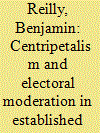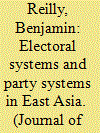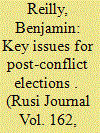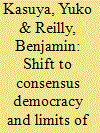|
|
|
Sort Order |
|
|
|
Items / Page
|
|
|
|
|
|
|
| Srl | Item |
| 1 |
ID:
159908


|
|
|
|
|
| Summary/Abstract |
Centripetal approaches to ethnic conflict management seek to promote inter-ethnic accommodation and moderation by making politicians dependent on the electoral support of groups other than their own base. There is an ongoing debate about the utility of such approaches, including which kinds of electoral systems can best promote moderate and centrist politics in deeply divided societies. Neglected in this debate, however, has been the experience of ethnically diverse established democracies utilizing centripetal electoral models. This article examines historical evidence from Australia, and recent natural experiments with subnational electoral reform in the United States, which lend support to centripetal claims that preferential, “ranked choice” or “instant runoff” voting can encourage electoral moderation and address political polarization.
|
|
|
|
|
|
|
|
|
|
|
|
|
|
|
|
| 2 |
ID:
078403


|
|
|
|
|
| Publication |
2007.
|
| Summary/Abstract |
Over the past two decades, numerous East Asian states have undergone transitions to democracy. One of the most distinctive aspects of democratization has been the way East Asian democracies have sought to manage political change by institutional innovations that aim to influence the development of the region's party systems. These reforms have typically tried to promote more centrist and stable politics by encouraging fewer, and hence larger, political parties. The result is an increasing evolution of the region's electoral and party system constellations toward more majoritarian elections and, in some cases, nascent two-party systems
|
|
|
|
|
|
|
|
|
|
|
|
|
|
|
|
| 3 |
ID:
080809


|
|
|
|
|
| Publication |
2008.
|
| Summary/Abstract |
On many measures of ethno-linguistic diversity, Papua New Guinea is the most fragmented society in the world. I argue that the macro-level political effect of this diversity has been to reduce, rather than increase, the impact of ethnic conflict on the state. Outside the Bougainville conflict, and (to a lesser extent) the recent upsurge of violence in the Southern Highlands, ethnic conflicts in Papua New Guinea have not presented a threat to national government. In contrast to most other ethnically diverse societies, the most consequential impacts of ethnic conflict in Papua New Guinea are at the local level. This paper therefore examines the disparate impacts of local- and national-level forms of ethnic conflict in Papua New Guinea.
|
|
|
|
|
|
|
|
|
|
|
|
|
|
|
|
| 4 |
ID:
156990


|
|
|
|
|
| Summary/Abstract |
Elections are central to many contemporary post-conflict accords, but poorly timed elections may have negative consequences for the consolidation of both peace and democracy. Benjamin Reilly examines key issues of: electoral timing, including how soon to hold elections following hostilities; whether to sequence national and local polls; and which models of electoral system and administration are most appropriate in post-conflict environments.
|
|
|
|
|
|
|
|
|
|
|
|
|
|
|
|
| 5 |
ID:
057227


|
|
|
|
|
| Publication |
Nov-Dec 2002.
|
|
|
|
|
|
|
|
|
|
|
|
|
|
|
|
| 6 |
ID:
176230


|
|
|
|
|
| Summary/Abstract |
For many years Australia ignored or downplayed the role of values in foreign policy, preferring to focus on economic issues and engagement with Asia. Recently, however, values have re-emerged as a central aspect of Australian foreign policy, both rhetorically in government White Papers and through initiatives such as the Quadrilateral Security Dialogue comprising the established democracies of Australia, India, Japan and the United States. This commentary charts the rise of values-based language in Australian and Japanese speeches and policy documents, and argues that core concepts such as shared democratic values have an important – and under-appreciated – relevance in the new era of a rising autocratic China and in the framing of the Indo-Pacific.
|
|
|
|
|
|
|
|
|
|
|
|
|
|
|
|
| 7 |
ID:
192550


|
|
|
|
|
| Summary/Abstract |
A ‘majoritarian turn’ identified by scholars of Asian democracy in the 1990s saw the rise of mixed-member majoritarian electoral systems and more centripetal party competition across both Northeast and Southeast Asia. In this paper, we argue that since the 2000s, the institutional pendulum has shifted, with more consensual approaches to democracy appearing to better represent key identity cleavages of gender, ethnicity, and territory—a trend evident not just in East Asia but South Asia as well. This new ‘Asian model’ typically involves increasing the proportional components of existing electoral formulas and grafting gender quotas, multiethnic party lists, and quasi-federal elements onto ostensibly majoritarian state structures. We show that these reforms have, as intended, mostly increased female and ethnic minority representation and decentralized governance structures. At the same time, however, these de jure changes are not associated with de facto political development in terms of greater democratic quality, counter to theoretical expectations. Indeed, democracy has declined across most of Asia at the same time as its democratic institutions have become more consensual.
|
|
|
|
|
|
|
|
|
|
|
|
|
|
|
|
| 8 |
ID:
057646


|
|
|
|
|
|
|
|